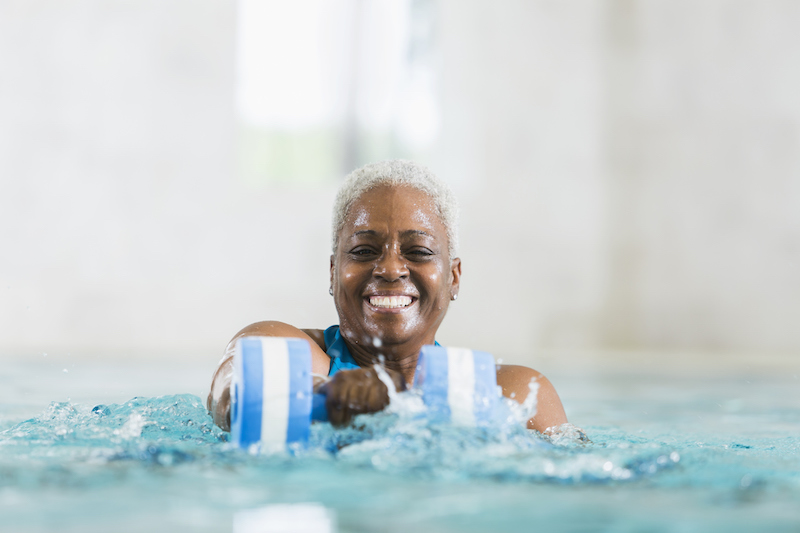Swimming has often been touted as the single best exercise for overall health and offers a host of health benefits that are especially important for you as a senior. It enhances strength, endurance, and flexibility, and does so in a low-impact environment which lowers the risk for exercise-induced injury.
Benefits for Seniors
Increases Lung Capacity
There are several natural changes in your body that may cause a loss in lung capacity as you age. Muscles like the diaphragm can get weaker. Lung tissue can lose elasticity, which makes airways smaller, and rib cage bones can change and get smaller, which leaves less room for your lungs to expand.
Regular cardiovascular exercise like swimming can increase or maintain lung capacity. In addition, the movements in swimming strengthen your core muscles as a whole where the muscles that move air in and out of your lungs reside. Studies have shown that swimming and practicing breath control can strengthen respiratory muscles.
Aids Heart and Circulatory Health
Swimming, in particular, offers numerous health benefits for the heart. A 2012 study of 43 older men and women (average age of 60) found that after they had started swimming a few times a week, their systolic blood pressure (that’s the top number) had declined.
Swimming helps you maintain control over your cholesterol levels.
It also helps your circulatory system to better supply oxygen to all of your body and remove harmful waste. This reduces the risk of embolism, a blockage caused by a blood clot in a vein that can break loose and become deadly.
Improved circulation can reduce your risk of stroke and other circulatory problems, and it can help your body move nutrients to cells that need repair.
The pressure from the water surrounding your skin helps your body move blood around to where it’s needed, particularly if you have edema or swelling in your lower limbs or poor circulation in your feet and toes because of diabetes.
Improves Strength
As you age, you lose muscle mass. But muscle mass can be retained or even increased by exercise. Swimming works many of the major muscle groups all at once. And different swimming strokes can target specific muscles.
Due to the buoyancy of the water, the strengthening exercises of swimming can be performed with less or no joint pain associated with weight-bearing exercises in your home or a gym.
Increases Flexibility
Swimming involves accessing a fuller range of motion to free up stiff joints and may help you gain a few more degrees or even full range of motion over time.
Swimming and pool-based therapy have long been mainstays of physical rehabilitation after injury, surgery, or severe illness.
Increased flexibility makes it easier to reach high on a shelf or pick up something off the floor. And improved mobility means more independence for you.
Improves Stability and Reduces Fall Risk
The improved muscle performance associated with swimming translates into a decrease in the number of falls for seniors.
A study that monitored how often 1,700 men over the age of 70 fell over a period of four years found that the men who swam regularly were 33% less likely to fall compared to men who exercised in other ways.
Mental Health Benefits
Studies have shown swimming diminishes stress levels, lowers anxiety, reduces depression, and promotes positive feelings people have about themselves.
Exercise boosts production of chemicals in the brain and body that can significantly alter how you feel. Endorphins, in particular, are a group of hormones in the brain and nervous system that stimulate cells’ opiate receptors, which reduce pain.
Feel-good brain chemicals are boosted by vigorous physical activity and also increase steroid reserves which enable you to become more resilient to stress.
In addition, swimming seems especially adept at influencing mood by increasing the number of certain neurotransmitters in your brain, namely serotonin, noradrenalin, and dopamine.
In a class or group setting swimming promotes socialization, which also increases mental health benefits.
Improves Sleep Quality
Fifty percent of older adults have difficulty sleeping, which leads to an increased risk of mortality. Aerobic exercise like swimming leaves the body tired and relaxed enough to sleep longer and more deeply.
Boosts the Immune System
Your immune system is there to help prevent bacterial, fungal, and other potentially problematic agents from running rampant and making you very sick.
Exercise—especially aerobic exercise like swimming—can help support a healthy immune system.
Provides Cognitive Benefits
Aerobic exercise has also been shown to increase the levels of a protein in your brain and spinal cord that promotes the survival, growth, and maintenance of neurons. Studies have shown that increased levels of this protein can have wide-ranging, positive effects on cognition, memory, and mood regulation, all functions of a healthy brain that’s aging well.
For more information for fitness for seniors, visit Bethesda’s Senior Living blog.
| With 133 years of experience, our non-profit has set the bar for quality and compassionate senior living in St. Louis. If you are considering assisted living, we encourage you to tour our communities, including Bethesda Hawthorne Place and Assisted Living at Charless Village. With our full spectrum of care, including independent living, assisted living, memory care, and skilled nursing, rest assured that all of your care needs will be met by highly-trained nurses and aides. |
Want to find out more?
If you’d like to stay up to date with Bethesda Health Group, sign up here to receive our blog and newsletters!
"*" indicates required fields
Related Articles
Want to find out more?
If you’d like to stay up to date with Bethesda Health Group, sign up here to receive our blog and newsletters!
"*" indicates required fields



